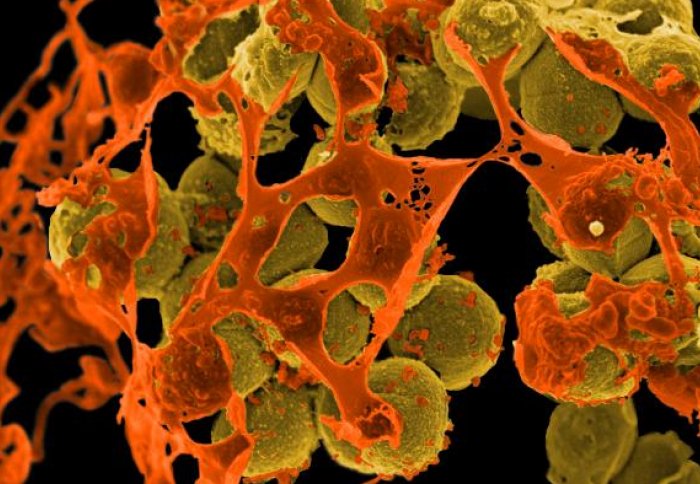Imperial's MRC CMBI receives five-year funding boost
by Ryan O'Hare

The MRC CMBI's research includes finding out how the 'superbug' MRSA (pictured) evades antibiotics
An Imperial centre dedicated to the study of disease-causing bacteria has secured significant new funding to continue its work on to 2022.
Following a highly favourable review process, the Medical Research Council (MRC) announced that funding for the MRC Centre for Molecular Bacteriology and Infection (CMBI), based at Imperial College London, has been renewed for a further five years.
The MRC CMBI is a centre of excellence for research and training in molecular mechanisms of bacterial infection biology and host immunity.
This new funding will enable us to capitalize fully on the progress we have made over the last five years
– Professor David Holden
Director of the MRC CMBI
Researchers within the centre hope their work will lead to lead to new diagnostics, effective vaccines and antibacterials, to help combat the rising threat of drug-resistant bugs.
The new MRC grant will enable the centre to continue its PhD training programme for academics and clinicians, as well as supporting a new high throughput single-cell analysis facility.
Imperial College London has committed to matching the funds, which will be used to refurbish laboratory space and create new lectureship and senior lectureship posts in the important areas of anti-microbial resistance and the microbiota.
Commenting on the funding announcement, Director of the CMBI, Regius Professor David Holden, said: “On behalf of everyone in the CMBI I want to thank the MRC and Imperial for their continued support of our Centre. This new funding will enable us to capitalize fully on the progress we have made over the last five years and to consolidate the CMBI as the pre-eminent Centre for research and training in bacterial infection biology.”
Extending research excellence
The range of research project opportunities will be expanded through an extensive network of collaborators outside the CMBI, including other members of Imperial’s Antimicrobial Resistance Collaborative, Imperial hospital clinicians, and complementary research centres and industrial partners.
Recent highlights of the Centre’s research include a new test to identify dangerous bacteria resistant to last-resort antibiotic Colistin, insights into how the ‘superbug’ MRSA uses decoys to evade the antibiotic Daptomycin and the discovery of a mechanism by which Salmonella blocks the development of efficient immunity.
Professor Holden said the Centre is proud of its achievements in developing the next generation of researchers from postgraduate students to Fellows and independent group leaders.
In the last three years, two early career group leaders have been awarded the prestigious Lister Institute Research Prize in recognition of their research within the CMBI.
-
This article was adapted from materials provided by the MRC CMBI.
Featured image: Methicillin-Resistant Staphylococcus aureus (MRSA) Bacteria. CC 2.0 Flickr/NIAID
Article supporters
Article text (excluding photos or graphics) © Imperial College London.
Photos and graphics subject to third party copyright used with permission or © Imperial College London.
Reporter
Ryan O'Hare
Communications Division